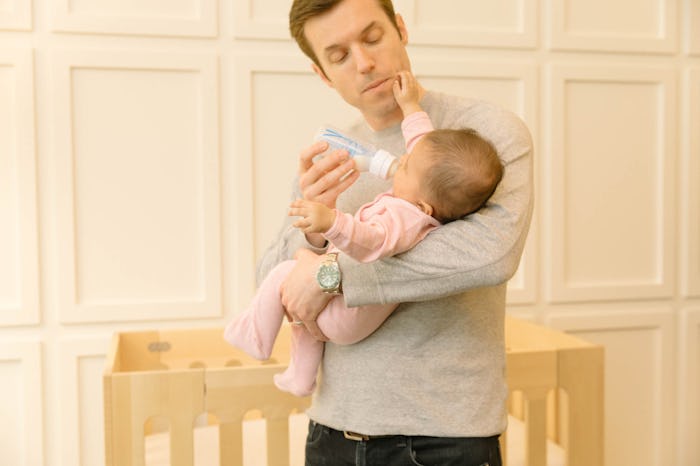Life
Here's How To Know If Your Baby Is Just Spitting Up Or Actually Vomiting
I'm embarrassed to say that the first newborn I interacted with for any amount of time was my own. Sure, I'd held babies at showers and parties, but you really don't know a thing about infancy until you spend at least 24 hours with an infant. And then, expect it to be a pretty harrowing 24 hours. Is she eating enough? Pooping enough? Everything that goes into, or comes out of, your baby's body is a potential source of anxiety. I remember asking, "What's the difference between spit-up and vomit?" It turns out the difference is stark.
"Generally babies are unconcerned after they spit up," explains Kristin Gourley, International Board Certified Lactation Consultant (IBCLC) with Lactation Link, LLC, in an email interview with Romper. "It is white, but appearance can vary and can be curdled or look like straight milk." Often, babies spit up directly after a feeding. Sometimes yellow mucus comes up, which sounds frightening. However, the key word here is unconcerned. As you may have noticed, babies are super chill after they spit up. It might even be their superpower.
"Spitting up is a relatively normal physiologic process in babies; it's harmless," writes pediatricain Dr. Jarret Patton, MD in an email interview with Romper. "The cause can be from overfeeding or inefficient burping." He goes on to note that when a baby spits up, they throw up only a portion of what's in their tummies. In contrast, vomiting is more forceful, with larger quantities coming up. While overfeeding can sometimes cause vomiting, viruses, formula intolerance, or gastroesophageal reflux disease (GERD) may also be behind it, according to Patton. "If at anytime the stomach contents appear bloody or green colored, your baby should be seen by a physician immediately," he says.
According to BabyCenter, babies spit up so much because they're still new to the world of eating, ingesting, and digesting. Essentially, they're swallowing pockets of air with that breast milk or formula and coughing it up as a result. The medical term for spitting up is reflux, and on average, babies have the most reflux around 4 months. Mayo Clinic even calls spitting up "a rite of passage" for babies — at least, it's certainly a test for your washing machine. But spitting up shouldn't really bother your baby. Like I said, it's a superpower.
Vomiting, on the other hand, is unpleasant for grown people and babies alike. When a baby is vomiting, they might heave without spitting up anything, and you'll probably notice other issues, too. "In general, baby will likely feel unwell and may have diarrhea or other symptoms like a persistent cough as well," writes Gourley.
So how much spit-up is normal, and how much is too much?
"Normal spit-up amounts range by a lot," writes Gourley. "It can look like baby has spit up their whole feed, but it's much more likely that it simply looks like a lot of milk when it really isn't that much." Gourley suggests pouring a tablespoon of water onto the table and comparing that with your baby's usual spit-up. On a flat surface, even a tablespoon of fluid will look like a lot. Basically, you don't have to worry about how much your baby is spitting up, as long as they seem relaxed and content.
Of course, there are some symptoms parents should always be on the lookout for. Here's Gourley:
"Concerning symptoms might be extreme, inconsolable fussiness, abnormal bowel movements, not gaining weight, dehydration, or distress or fussiness while eating. If baby is happy, healthy, and growing well, then spit-up is generally just a laundry problem, even if it sometimes looks like a lot."
The human race hasn't lasted this long by keeping illness quiet and mysterious. When a baby is sick, chances are they'll let you know — loudly, and throughout the night. When in doubt, however, it's always OK to call your pediatrician. I promise you're not the first parent to ask about the difference between vomit and spit-up, nor will you be the last.
Check out Romper's new video series, Romper's Doula Diaries:
Watch full episodes of Romper's Doula Diaries on Facebook Watch.
